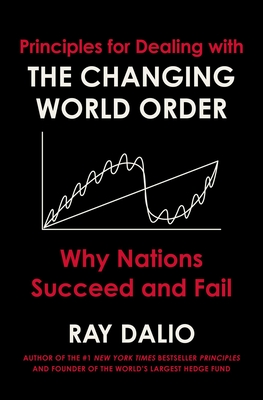The Changing World Order: Why Nations Succeed and Fail

The Changing World Order: Why Nations Succeed and Fail
From legendary investor Ray Dalio, author of the #1 New York Times bestseller Principles, who has spent half a century studying global economies and markets, Principles for Dealing with the Changing World Order examines history's most turbulent economic and political periods to reveal why the times ahead will likely be radically different from those we've experienced in our lifetimes--but similar to those that have happened many times before. A few years ago, Ray Dalio noticed a confluence of political and economic conditions he hadn't encountered before. They included huge debts and zero or near-zero interest rates that led to massive printing of money in the world's three major reserve currencies; big political and social conflicts within countries, especially the US, due to the largest wealth, political, and values disparities in more than 100 years; and the rising of a world power (China) to challenge the existing world power (US) and the existing world order. The last time that this confluence occurred was between 1930 and 1945. This realization sent Dalio on a search for the repeating patterns and cause/effect relationships underlying all major changes in wealth and power over the last 500 years. In this remarkable and timely addition to his Principles series, Dalio brings readers along for his study of the major empires--including the Dutch, the British, and the American--putting into perspective the "Big Cycle" that has driven the successes and failures of all the world's major countries throughout history. He reveals the timeless and universal forces behind these shifts and uses them to look into the future, offering practical principles for positioning oneself for what's ahead.
From legendary investor Ray Dalio, author of the #1 New York Times bestseller Principles, who has spent half a century studying global economies and markets, Principles for Dealing with the Changing World Order examines history's most turbulent economic and political periods to reveal why the times ahead will likely be radically different from those we've experienced in our lifetimes--and to offer practical advice on how to navigate them well. A few years ago, Ray Dalio noticed a confluence of political and economic conditions he hadn't encountered before. They included huge debts and zero or near-zero interest rates that led to massive printing of money in the world's three major reserve currencies; big political and social conflicts within countries, especially
PRP: 257.83 Lei
Acesta este Prețul Recomandat de Producător. Prețul de vânzare al produsului este afișat mai jos.
232.05Lei
232.05Lei
257.83 LeiLivrare in 2-4 saptamani
Descrierea produsului
From legendary investor Ray Dalio, author of the #1 New York Times bestseller Principles, who has spent half a century studying global economies and markets, Principles for Dealing with the Changing World Order examines history's most turbulent economic and political periods to reveal why the times ahead will likely be radically different from those we've experienced in our lifetimes--but similar to those that have happened many times before. A few years ago, Ray Dalio noticed a confluence of political and economic conditions he hadn't encountered before. They included huge debts and zero or near-zero interest rates that led to massive printing of money in the world's three major reserve currencies; big political and social conflicts within countries, especially the US, due to the largest wealth, political, and values disparities in more than 100 years; and the rising of a world power (China) to challenge the existing world power (US) and the existing world order. The last time that this confluence occurred was between 1930 and 1945. This realization sent Dalio on a search for the repeating patterns and cause/effect relationships underlying all major changes in wealth and power over the last 500 years. In this remarkable and timely addition to his Principles series, Dalio brings readers along for his study of the major empires--including the Dutch, the British, and the American--putting into perspective the "Big Cycle" that has driven the successes and failures of all the world's major countries throughout history. He reveals the timeless and universal forces behind these shifts and uses them to look into the future, offering practical principles for positioning oneself for what's ahead.
From legendary investor Ray Dalio, author of the #1 New York Times bestseller Principles, who has spent half a century studying global economies and markets, Principles for Dealing with the Changing World Order examines history's most turbulent economic and political periods to reveal why the times ahead will likely be radically different from those we've experienced in our lifetimes--and to offer practical advice on how to navigate them well. A few years ago, Ray Dalio noticed a confluence of political and economic conditions he hadn't encountered before. They included huge debts and zero or near-zero interest rates that led to massive printing of money in the world's three major reserve currencies; big political and social conflicts within countries, especially
Detaliile produsului











